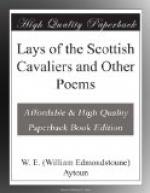“That our family has suffered exile during these fifty-seven years everybody knows. Has the nation, during that period of time, been the more happy and flourishing for it? Have you found reason to love and cherish your governors as the fathers of the people of Great Britain and Ireland? Has a family, upon whom a faction unlawfully bestowed the diadem of a rightful prince, retained a due sense of so great a trust and favour? Have you found more humanity and condescension in those who were not born to a crown, than in my royal forefathers? Have their ears been open to the cries of the people? Have they, or do they consider only the interests of these nations? Have you reaped any other benefit from them than an immense load of debt? If I am answered in the affirmative, why has their government been so often railed at in all your public assemblies? Why has the nation been so long crying out in vain for redress against the abuse of Parliaments, upon account of their long duration, the multitude of placemen, which occasions their venality, the introduction of penal laws, and, in general, against the miserable situation of the kingdom at home and abroad? All these, and many more inconveniences, must now be removed, unless the people of Great Britain be already so far corrupted that they will not accept of freedom when offered to them, seeing the King, on his restoration, will refuse nothing that a free Parliament can ask for the security of the religion, laws, and liberty of his people.
“It is now time to conclude; and I shall do it with this reflection. Civil wars are ever attended with rancour and ill-will, which party rage never fails to produce in the minds of those whom different interests, principles or views, set in opposition to one another. I, therefore, earnestly require it of my friends to give as little loose as possible to such passions: this will prove the most effectual means to prevent the same in the enemies of my royal cause. And this my declaration will vindicate to all posterity the nobleness of my undertaking, and the generosity of my intentions.”
There was much truth in the open charges preferred in this declaration against the existing government. The sovereigns of the house of Hanover had always shown a marked predilection for their Continental possessions, and had proportionally neglected the affairs of Britain. Under Walpole’s administration the imperial Parliament had degenerated from an independent assembly to a junta of placemen, and the most flagitious system of bribery was openly practised and avowed. It was not without reason that Charles contrasted the state of the nation then, with its position when under the rule of the legitimate family; and had there not been a strong, though, I think, unreasonable suspicion in the minds of many, that his success would be the prelude to a vigorous attack upon the established religions of the country, and that he would be inclined to follow out in this respect the fatal policy of his




